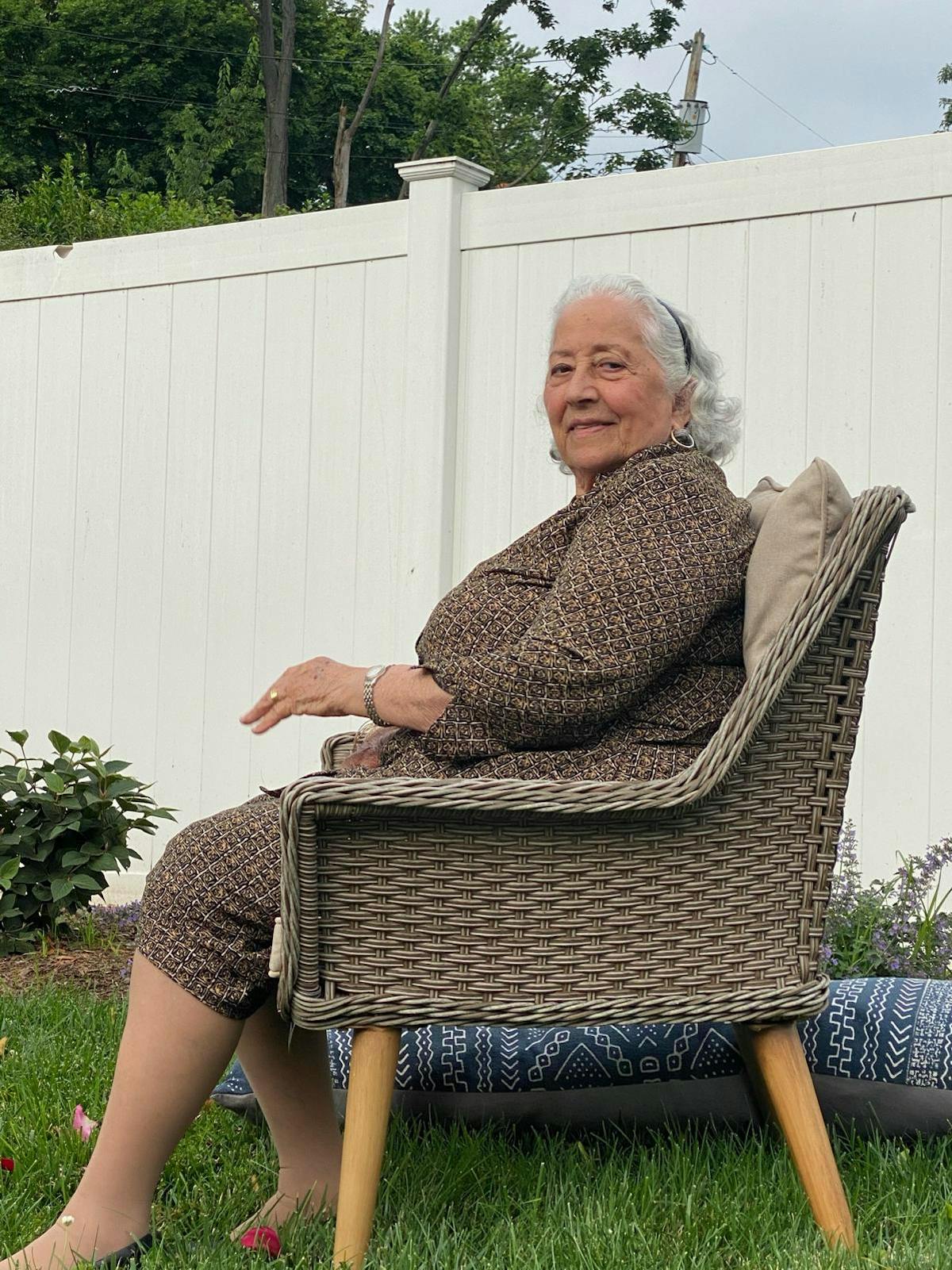Massaya: The Spirit of Lebanon Distilled

Words by Ian Garcia (Sommelier at ilili NoMad)
pictured above is Lila Daguer (Dagher) in her garden in Colombia
My daughter’s great-grandmother, Lila, is ninety-two years old. She was born in Colombia, raised Catholic, and later became a devoted Jehovah’s Witness. Faith has been a guiding thread through her life, but what strikes me most is the way she also carries Lebanon within her. Above her bed it is not the Colombian flag that hangs, but the Lebanese flag, the cedar tree her guardian every night.
Her connection to Lebanon is as real as blood. On her visit years ago, she walked into the Massaya Winery in the Beqaa Valley. There she tasted the Massaya Gold Reserve, and that became the one wine she ever allowed herself to drink. It was not about indulgence. It was about recognition, the spirit of Lebanon distilled, twilight captured in a glass. That moment changed her forever.
Lebanon has shaped her identity in ways that sit alongside her faith and her Colombian roots. She made fried kibbeh in her kitchen as naturally as if it had always been on her family’s table. She describes the Muslim call to prayer not with distance but with warmth, as something nostalgic and comforting. She is Colombian, Catholic by upbringing, a Witness by choice, and yet deeply, unmistakably Lebanese too.
And in a way, she is the reason I found my way into Lebanese wine. When I applied to ilili, when I first poured a Lebanese bottle with a trace of familiarity, it was because of her story. Massaya Gold was her wine, and somehow, my beginning.
The word massaya itself does not mean messiah, as many assume. In Lebanese Arabic it means twilight, that fleeting blue moment when the sun sinks into the Mediterranean. Just as ilili means “tell me”, Massaya is its own poetry, tied to place and feeling.
The winery was built by the Ghosn brothers, Sami and Ramzi, who returned after the civil war to reclaim their land. From the start, they partnered with the Brunier family of Châteauneuf-du-Pape and the Hébrards of Bordeaux, weaving Beqaa Valley soil with Rhône spice and Bordeaux structure. The result is a Lebanese wine that is also international, rooted and scattered, just like Lebanon itself.
I have seen that same energy in Sami Ghosn whenever he visits ilili. He comes often, and when the moment feels right, he will step to a table to talk about Massaya Gold or join a conversation if he overhears a guest has ordered one of his wines. He has the intensity of someone who reclaimed vineyards in unstable times, but he delivers it with the cool poise of a Bond villain, magnetic, commanding, and endlessly fascinating. He speaks of Massaya with fire, but never without composure.
Sami’s favorite is often Cap Est, variously a blend of Grenache and Mourvedre (though in the current 2018 vintage now a 100% Grenache) from the cooler eastern slopes of the Beqaa. It is lifted and elegant, red-fruited and fragrant, with a silken texture that feels both polished and effortless. He also loves the rosé, which we pour by the glass, Provençal in frame but unmistakably Lebanese in accent. And of course, the arak, Lebanon’s ancestral spirit.
The first arak I ever tasted was Massaya’s. I still remember the bottle, luminous blue, the same shade as the Mediterranean at dusk. It tied back to the very meaning of massaya: twilight, cool and fleeting. For me, it was not just a drink but an initiation into Lebanon’s deepest traditions.
And then there are the wines themselves. The Massaya Gold Reserve 2012, the wine that changed Lila, is full-bodied, powerful, Cabernet and Mourvedre at its core along with a lick of peppery Syrah savoriness, yet carrying the warmth and cedar spice of Lebanon. It fills the palate with richness and presence, a twilight wine meant to endure. Cap Est, Sami’s choice, is all elegance and finesse, silk and lift to temper the alcoholic heft. The Massaya Blanc, a blend of Sauvignon Blanc and indigenous Obeidi (somewhat resembling a Viognier), is mountain-born and saline, delicate to the point of feeling ethereal, graceful and fleeting. Even the rosé, light and breezy, carries a subtle spice that anchors it to the Levant.
Lila’s life shows me that Lebanon is never confined to borders. It lives in a Colombian kitchen where kibbeh sizzles in oil. It lives in the warmth someone feels at a call to prayer outside their own faith. It lives in the cedar above her bed, in the twilight blue of a bottle of arak, in the one glass of Massaya Gold she allowed herself.
That is Lebanon, a homeland that travels, a culture that belongs wherever it is carried. You can be Lebanese and Colombian, Lebanese and French, Lebanese and American. Or you can be like my daughter, Puerto Rican, Colombian, Lebanese, and American all at once, and still carry Lebanon in your identity. To her, it will never be one fixed place but a history of movement and inheritance, something transient yet deeply rooted. Massaya captures that same truth, Lebanon in a glass but never only Lebanon.
For Lila, Massaya Gold was the wine of her life. For me, it was the thread that pulled me to ilili. And for my daughter, it is already part of who she is, a memory projected forward.
